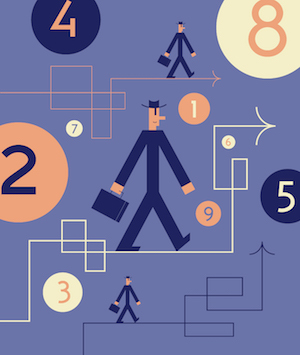LENS Business, Law and Policy
The Choices We Make
Behavioral Economists Help Decipher the Good, Bad and Purely Confounding
 IMAGE: GREG MABLEY/THEISPOT
IMAGE: GREG MABLEY/THEISPOTHuman beings are predictably irrational—more like Homer Simpson than Mr. Spock, according to Richard H. Thaler, PhD (ADL '67, HON '03), a University of Chicago professor who won the 2017 Nobel Prize for economics.
Thaler is a pioneer in the field of behavioral economics, which thrives at universities such as Case Western Reserve University, where faculty, including Mariana Carrera and Justin Gallagher, mine our idiosyncrasies.
Carrera, PhD, an assistant professor at Weatherhead School of Management, focuses on health economics, particularly how people make decisions—like the notoriously fraught question of whether to go to the gym.
The standard economic model would suggest that once we decide to spend money on a gym membership, we'd go ahead and exercise. In reality, of course, we don't.
She has studied various interventions to lure us off the couch, including offering cash incentives. Alas, one study found that money didn't work. New gym members who were offered up to $60 in gift cards if they went to the gym more often, didn't.
It's hard to get people to make healthy choices because the rewards are not immediate, Carrera said.
"People see the benefits, but those are in the future," she said. "Whereas the pain of going to the gym instead of doing something else, or the pain of choosing salad instead of the delicious cheeseburger—that pain we have to feel upfront."
And Gallagher, PhD, an assistant professor of economics at the Weatherhead School and an environmental economist, recently studied how people decide whether to buy flood insurance.
Most homeowners in flood- prone areas don't buy annual ood insurance, even though they know the risks. But after a ood, purchases soar, said Gallagher, who examined data from communities across the country.
Under the standard economic model, the decisions "every year should be the same," he said. But in behavior economics, timing does matter. Although it's not rational, people give more weight to recent experiences than long-ago ones. That's why, 10 years after the ood experience fades, they stop buying insurance, his research concluded.
Economics proves its worth in another arena, too: the home. Carrera and Gallagher are spouses as well as colleagues, and, as busy parents of two young children, they put their expertise to good use.
In a nod to the default effect— which means that actions we preset get done despite our forgetfulness, procrastination or whatever—they have set up automatic payroll-deduction savings, bill payments and diaper deliveries. Knowing that commuting to work ranks last in producing positive feelings—be- low housework and work—they bought a house near campus.
"Being married to another economist, we often use the language of economics when making decisions," Carrera said. "We are often thinking, 'What's the marginal cost or the marginal benefit of these possible choices?' "





